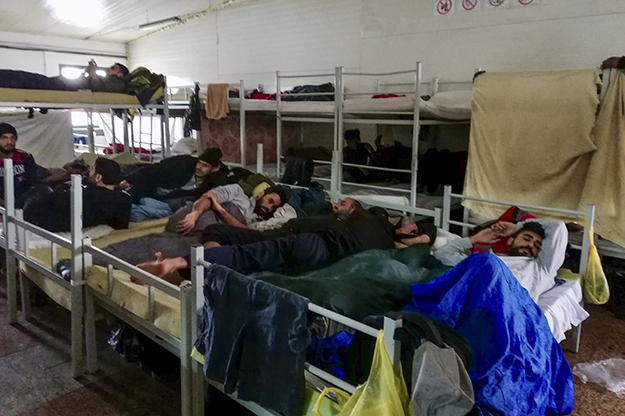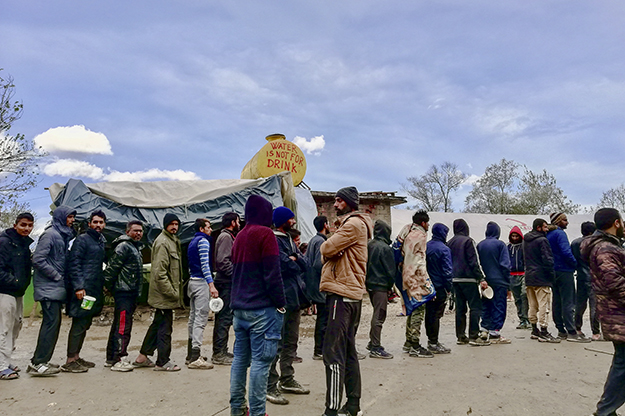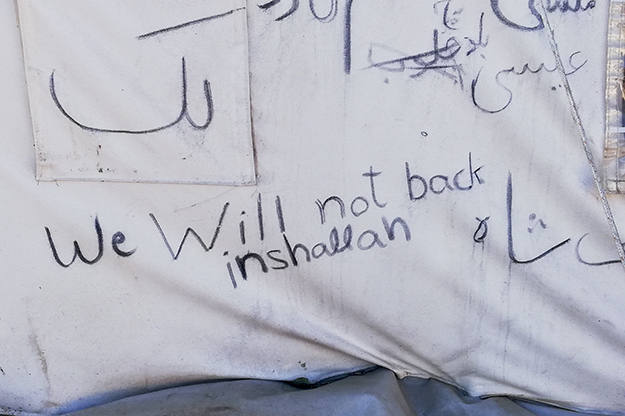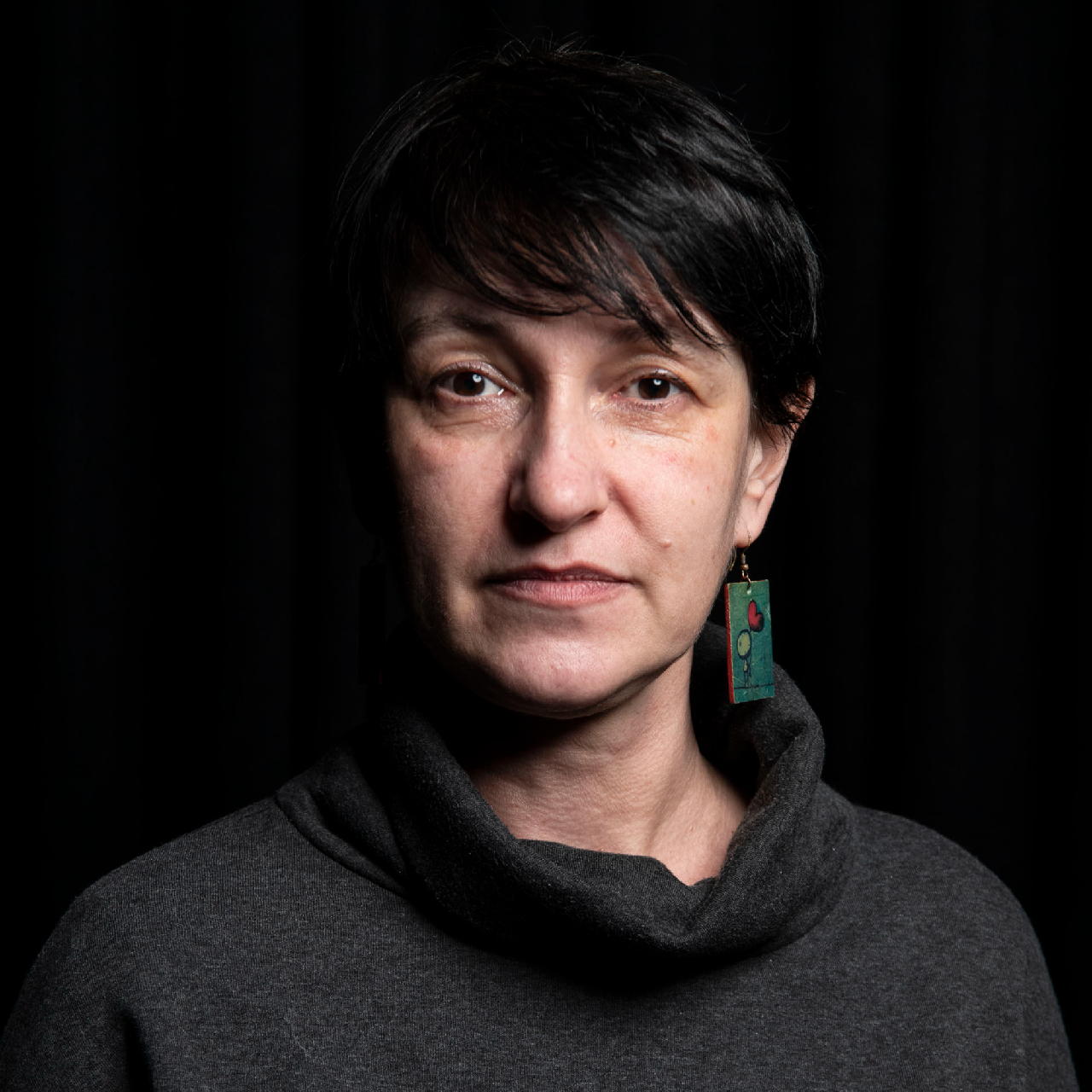Act One
Vučjak, former city landfill site in Bihać. In the immediate vicinity of the Croatian border (2 km), surrounded by minefields leftover from the war. Monday, November 4, around 2 p.m.
A long and meandering column of people wait for their first warm meal. Some four months ago, the Bihać city administration decided to make Vučjak the place where refugees, men for whom there is no space in other camps, should live. The camp has been improvised on the site of the old city landfill, in the immediate vicinity of the former battlefield frontline, surrounded by minefields.
In Vučjak, everything is makeshift, including the lives of those forced by the police and the government of the Una-Sana Canton to reside there. Almost daily, the police have been conducting raids, and forcefully bringing people to this area, leaving them to manage on their own.
On this Monday, as with every other day, the local Red Cross bring lunch, one of two daily meals. One by one, people take their places, patiently waiting in line. Some, mostly young men, including minors, have no shoes because they either lost them during an attempt to cross the border, or the Croatian police made them take them off and sent them walking back into Bosnia and Herzegovina.
Some people have only summer clothes, T-shirts and shorts. Others are wearing oversized jackets that barely allow them to move freely. Those who don’t even have a jumper are walking draped in donated colorful blankets.
At one moment, a young police officer who just recently took over his eight-hour shift in Vučjak, starts walking past the queue. While he walks in big, decisive steps next to the washed-out people, he puts on black gloves. Suddenly, he stops and randomly approaches one of the people standing quietly in the line, roughly grabbing him by the arm, slightly bending his knees and hitting him in the face with his clenched fist. The young man moans. The others are silenced.
“Look, police boom,” said the young man approaching me and two foreign journalists. The three of us look at him speechless, shocked by what had just occurred in front of us. A Dutch colleague takes out his camera and photographs the face of this young man, perhaps a boy even. My colleagues tell me this isn’t the first time something like this has happened.
The others in the food line keep their heads down, while the policeman positions himself next to the queue, continuing to search for a new victim, it seems. I react, phoning the police headquarters and reporting the violence.
After my report, another two police officers approach me, isolating me and investing a lot of effort into intimidating me. Although I show them my journalist accreditation, they threaten and shout at me, telling me that this is the last time that I will ever set foot in Vučjak again, and that they are going to take me into detention.
Still, I stay with them and some 800 people in that landfill until the end of the day.
Act Two (Prequel)
The parking lot of the temporary reception center, former factory, Bira in Bihać. Monday, November 4, around 1 p.m.
A little earlier that same day. Around 10 police officers are moving around the parking lot, approaching everybody who they believe could be a refugee — primarily meaning people of a different skin color — and demanding ID in rough voices. Those who have none are pushed to the side. Some people enter the camp, while others are separated to the side after the police take away their camp-issued registration cards.
Then, they make them squat and wait until a van arrives to pick them up — they’re told to enter, in a two-by-two fashion. Some police officers have a medical mask over their faces and plastic, transparent gloves on their hands.

The parking lot in front of the Bira camp, during one of the daily raids. Photo: Nidžara Ahmetašević / K2.0.
A man in his pajamas is among those being taken away. I later find out that he had been staying in the Bira camp’s quarantine (hence the pajamas), and that he had gone outside to meet a friend. Still in his pajamas, the police take him to Vučjak.
While all this is happening, behind the Bira camp fence, stand the employees of several international organizations whose job it is to take care of the refugees and migrants. They smoke their cigarettes, smiling, as if nothing is going on on the other side of the fence.
Security and foreign organizations officials stationed at Bira, as well as in four other camps in Bosnia and Herzegovina’s northern parts, are paid for by the European Union through their partner organizations, in this case, the International Organization for Migration (IOM), UNHCR, and the Danish Refugee Council (DRC).
While later speaking to the people who were bussed off to the Vučjak landfill, we are told that this is everyday life for them. They add stories about how private security within the Bira camp, or at the entrance, sometimes threw punches at them as well. We’re told that the night before we came to Bira, a young man was beaten. I take a look at a video on somebody’s phone, showing hands covered in blood and the face of the young man who seems to be a minor.
These allegations about the violence have been in the public for over a year, but so far little has been done. When asked, the IOM, one of the organizations in charge of security, usually replies that they have taken measures or that local police have been informed. However, neither the prosecution in Bihać nor the police could confirm this, saying they have received no reports of violence in the camps.
Act Three
The main street in Bihać. Anyday.
The police, and sometimes special units in masked uniforms and kevlar jackets, march through town in search of dark skinned people. When they find them, they ask for documents, which they often don’t even look at. They group people, two-by-two, placing them in a queue, one in front of the other and, surrounding them, force them to march through town. If a vehicle is available, they drive the people away, while sometimes they make them walk almost 10 km up to Vučjak, escorted by the police.
Citizens of Bihać have to put up with this violence every single day. They have to look at it and remain silent. Local media are often invited to this public humiliation of people on the move, while the videos are then shown on Una-Sana Canton TV and their portal, the public broadcaster, and shared on social media.
One of these days, after the police had forcibly taken people away, my colleague Ajdin Kamber attempted to pose a question to the authorities as to whether they were consciously violating the laws of Bosnia and Herzegovina and the international conventions that guarantee rights, including the freedom of movement, of people on the move. He was kicked out of the building, escorted by the prime minister of the Canton himself, who told him: “You’re free to go, mate. Come on now, cheers!”
That same week, when we both stayed in Bihać and observed what was going on, the new EU Special Representative in Bosnia and Herzegovina had arrived, delivering another donation for the local police in the form of 11 vans. It seems that their main function will be to transport people to Vučjak.
This is only one in a series of donations to the police since June 2018, when the EU officially started to participate in providing support to Bosnia and Herzegovina to handle the increasing number of refugees and migrants in its territory.
Since then, Bosnia and Herzegovina has received around 36 million euros from Brussels in the form of donations. This money has mostly been spent through the partners they had selected, including IOM, UNHCR, UNICEF and the DRC.
They should be taking care of the accommodation, health and other basic needs of these people on the move. However, the way how the money is spent is not transparent, and from what people can see, a large part of it is being used for strengthening borders and police forces in the country.
It’s a suggestion explicitly rejected by the EU, which says 94% of its funding has gone directly toward caring for migrants; meanwhile, the IOM, which is responsible for managing the budget allocated to Bosnia, puts this figure at 75%.
Not far away from Bihać is Velika Kladuša, one of the most important crossing points from Bosnia to the EU. Most of the people on the move here are forced to live in informal settlements, such as abandoned buildings — around 600 are in the camp Miral, which opened last fall in the former PVC factory.

At least two people share one bed in the Miral camp, Velika Kladuša. Photo: Nidžara Ahmetašević / K2.0.
In the Miral, people sleep on iron beds squeezed side by side. Sometimes, multiple persons have to use a single bed. Everything around them is gray and gloomy. The atmosphere doesn’t remind us of a place where anyone could expect to be protected. There is no privacy at all. The official response is that conditions in the camps meet “international standards.”
As with the foreign organizations’ employees positioned in front of the Bira camp, the EU has been observing a genuine humanitarian crisis in Bosnia and Herzegovina for the past few months. In this same manner, they are bearing witness to the violence at their borders — in Greece, Bulgaria, Romania, Hungary, and Croatia. They may condemn the conditions at camps in Bosnia, but under their watch, violence is becoming a new normality in Europe.
Women, children and men who try to reach Western countries fall victim to dehumanization in every possible way along the road. From isolation in camps that resemble concentration camps, to brutal beatings when they attempt to cross the border, and the denial of the right to access the asylum system.
In Bosnia and Herzegovina, one of the poorest states in Europe, and one that shares a 1,000km long border with the EU, this disgrace is presented in its most brutal form, such as the aggravated young police officer who puts on his black gloves while walking past people in a food line, seeking out people to punch.




